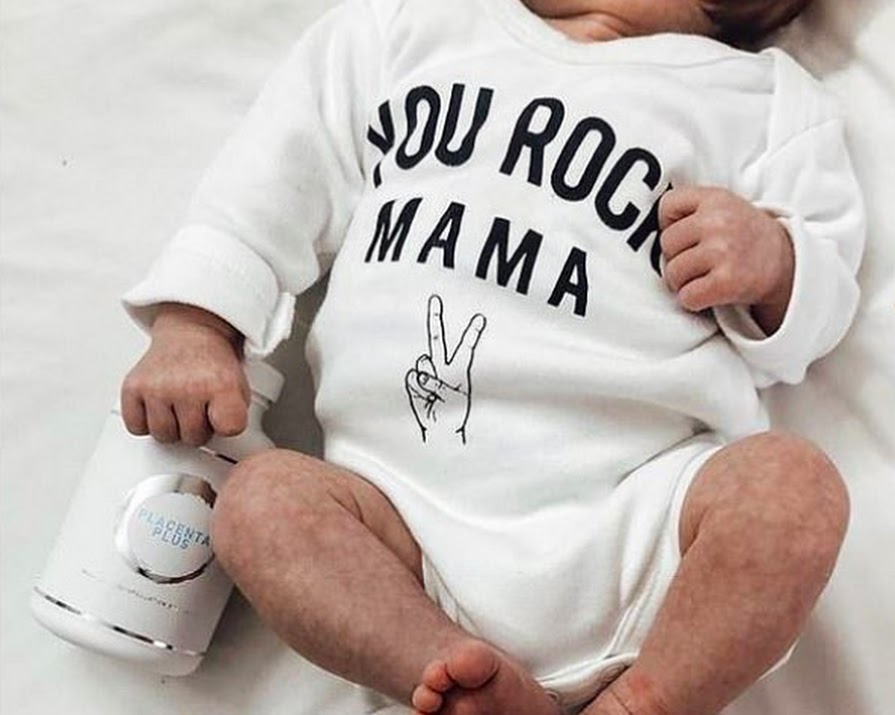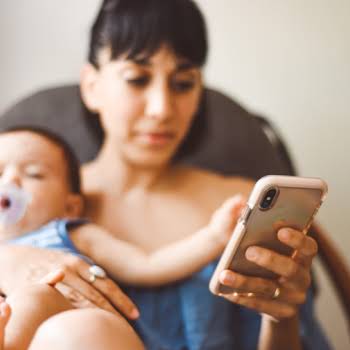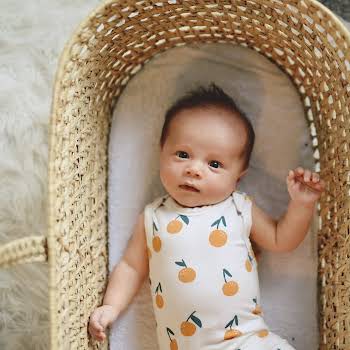
‘Baby influencers’: are parents exploiting their children for a quick buck?
By Amanda Cassidy
08th Nov 2019
08th Nov 2019
The greatest threat to children’s privacy online may not come from companies or online predators. It most likely comes from parents with one eye on commercial interests.
Ok, guilty. I’ve posted cute pictures of my children on Instagram.
Because they are cute and I’m proud of them. But my account is private, I don’t write about their issues or sensitivities, and I don’t make money from social media and, for the most part, I conceal their faces because… internet weirdos.
Recently, though, there have been some pretty shocking examples of professional bloggers using their own children to boost their following, fish for likes, and to generally up their profile.
But how far will influencers go to promote their children by extension of themselves? Is there anything so wrong about using your children online when it comes to making money? And aren’t we all just narcissistic junkies chasing the adrenaline kick of a few more likes?
This week, Love Island star Jess Shears came under fire for using a picture on social media of her as-yet-unnamed baby to flog placenta pills.

The 26-year-old, who welcomed her first child with husband Dom Lever in October, posted the picture of the newborn holding the branded box of pills.

Immediately Jess was criticised for ‘selling the baby’s soul’ and for pushing Instagram influencing too far. The furious stream of comments included: “This and you is what is wrong with modern society… Why is the baby holding the bottle your advertising jeez… Jesus Christ. There is just too much wrong with this picture.”
Popularity contest
Recently, another Internet sensation (how much do we hate that expression!) Kate Bower was on the receiving end of the Internet judge and jury. Her post lays bare some of the moral questions about our impulse to share everything and anything when it comes to our children.

Kate, from Atlanta, has a family slash lifestyle website called BowerPowerBlog.com which shares day-to-day life with her husband Jeremy and their five children.
On her Instagram page are reams of pictures celebrating milestones, house renovations, promoting shampoo and holidays, offering DIY tips, and those most tiresome of posts, musings on nullity with the hashtag ‘Tuesday thoughts’. But her Monday thoughts that particular week are what hit the headlines.
His photos never got as many likes. Never got comments. From a statistical point of view, he wasn’t as popular with everyone out there.”
She wrote a post under a caption of her rather cute six-year-old son. (We’ve removed his name because he is a minor.) It starts off innocently enough.
Related: Motherhood: The zero to hero effect
“Thankful for [x] today. My [x] was just the best baby….cuddly and easy…a hard toddler…always on the move and slow to talk which led to lots of crying…and one of the most helpful and sweet hearted little boys. He’s quiet except when he’s not…overflowing with a unique personality. He hates the car and is a complete homebody. He loves art and sports and is quick with a joke. He loves organizing and quality time and says one day he is gonna be a daddy to one hundred babies.”
And then things take a bleak twist when his mother talks about how devastated she is that he doesn’t get as many ‘likes’ as her other children.
“Guys I am gonna be perfectly honest…Instagram never liked my Munchkin and it killed me inside. His photos never got as many likes. Never got comments. From a statistical point of view, he wasn’t as popular with everyone out there.”
“Maybe part of that was the pictures just never hit the algorithm right”
In this ultra depressing rant, the little boy’s mother offers her two cents on why her son isn’t as ‘statistically’ popular as her other children including blaming his “squinty eyes”, the algorithm bias, and the fact that he is the middle child. She ends her post with a completely serious appeal to all her followers: to help him to get more likes as she plans to show him when he is older.
Sorry, what?
“Maybe part of that was the pictures just never hit the algorithm right. Part might be because he was the baby for a very short amount of time before [another child’s name] came along…and then [another child’s name] and then [another child’s name]. And people like babies. I say all that because I want to believe that it wasn’t him…that it was on me.
“My insufficiency caused this statistical deficit because obviously, my Munch should get ALL the love and squinty eyes are totally adorable. So can we do this right?
“Because I truly KNOW that my Munch deserves alllllll the likes…whether or not a stranger gives it to them. And on his sixth birthday, I am thankful that I know that…that no matter what other people think of me or my kids or my marriage or my house or my life or my everything…that they are 1000000000x better in real life than any tiny little picture could hold.”
So this is the world we now live in: a popularity contest where the prize of likes translates into cash. Family photos as a commodity.
The pushback that followed resulted in Kate removing the post but not before it got over 6,000 likes. How’s that for engagement?

Pram Power
Mummy Blogs have exploded in recent years. Many set them up as a way of finding an outlet for the long, lonely days of minding toddlers and changing babies’ nappies. Some craved shared experiences.
Suddenly children were being turned into mini commodities – child models and baby ‘influencers’.
I admit many of those blogs came in handy when I was off with my little ones. I’d nod along to relatable experiences and laugh at similar poo-nami episodes. For many, they are a godsend. But the danger is when their rampant popularity piqued the interest of the advertising world.
Suddenly, those with a huge following started being sent free products to review. Then, they didn’t even have to review them, just photograph their child with them. Suddenly children were being turned into mini commodities – child models and baby ‘influencers’.
Before long, parents were spilling their children’s secrets online too. The deeper the secret, the more engagement.
And engagement is valuable. Engagement sells products. Private moments are now being hocked for free prams and baby blankets— all without the consent of children. Has anyone stopped to think about the long-term implications?
At least with traditional advertising, you know you are being sold a product. ‘Sharing’ is another level of ‘influence’ and the lines are constantly being blurred.

Parental overshare’s most obvious flaw is its potential to humiliate. As the author Phoebe Maltz Bovy put it: “Do they understand what it means for information to be private? It’s generally understood that what kids put online about themselves can hurt them later. How can a child consent to a memoir?”

Ethically dubious
Influencer and midwife Clemmie Hooper shut down her Instagram account for a few months last year (her @mother_of_daughters account had 500,000 followers) after she was accused of ‘exploiting’ her kids and posting “ethically dubious” material. She responded to her critics, saying: “I don’t feel I ‘sell’ my children to make money, I actually hardly ever feature the older girls and have changed my approach when working with brands eg I won’t feature a picture of my children alone for an AD and I always ask ‘do they need to be in the post at all?’
I hardly ever feature them. They also see and give consent to any post where they are in the picture.”
However, she did admit that it crossed the line when her husband who has 850k followers on his Father of Daughter’s account posted a picture of her daughter using the potty.

With confession comes vanity
I watch, disturbed lately as some of the parents I follow, both professional bloggers and regular mums, post pictures of their children being vulnerable to hundreds of people, with captions about their anxiety, their bedwetting, their bullying, or their thoughts and dreams.
Their audience may include family and friends, but there are also thousands of anonymous faces, the faceless audience you are exposing your child to.
I ask myself why they feel the need to share this in the guise of connecting with others. Surely there is a way of doing this without broadcasting your child deep in slumber?
I wonder what these children will think when they are older – when they realise that strangers knew about their anxiety before they even knew themselves. I believe that with confession comes vanity and that’s where we are today. There is nothing wrong with sharing pictures of your children even in the name of vanity once your motivation is clear and you are honest with yourself about what you want to get out of it.
When vanity and confession do translate into cold, hard cash (or free Tayto Park tickets) then the real motivator behind all this ‘sharing’ is financial or quid pro quo.
And that’s another beast altogether. So what price do you put on your child’s privacy? Often children are already commodified while still in the womb. But for our friend Kate Bower, she has it all thought through. It’s the business of the thing that’s the problem, she says:
And as far as analytics are concerned, sadly, that does not include her second son.
Next!
Feature image via Instagram
Read more: Is social media good for your health?
Read more: What happened when I quit social media for 5 months
Read more: Life with a child with ADHD























